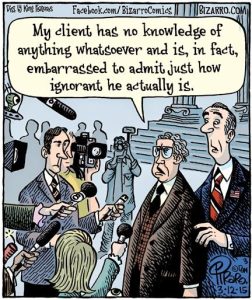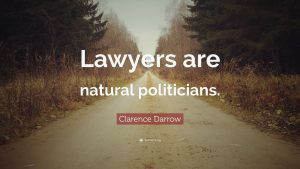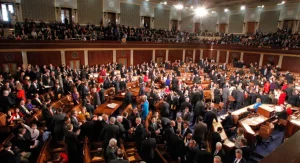Like many of my fellow students, when I was an undergraduate, I was conflicted about what my major should be.
Finally, I narrowed it down to four areas: advertising, veterinary medicine, law, and journalism.
After laboring through organic and inorganic chemistry classes, I abandoned a career as a veterinarian. I grew up on a farm so I had an innate love of animals—but not enough to struggle through advanced biochemistry, pharmacology, cellular biology, and physics classes that I knew loomed ahead.
Ultimately, I settled on journalism. No more chemistry, very little math, and zero physics. It was apparently the correct choice because I practiced it for 27 years as a reporter, foreign correspondent, national correspondent, and editor with the Chicago Tribune. Then, I went on to teach it as a professor and journalism school dean at the University of Illinois.
But let’s rewind to the University of Kansas, where I studied journalism.
One of the required classes in the journalism curriculum was something called “Law of the Press.” It was taught by a tough and slightly curmudgeonly 70-something professor who also happened to be a lawyer.
In order to pass that class, you had to spend hours in the law library briefing cases he would assign you. That meant pouring through musty law books, looking for decisions, precedents, and appeals. Then, you had to put your thoughts into a brief that explained the case, how it was prosecuted and defended, the decision reached by a jury or judge, whether it was appealed, and the result of that appeal.

At first, I found the process of briefing cases such as New York Times vs. Sullivan—a landmark libel case that made its way to the Supreme Court—fascinating and even invigorating.
I won’t bore you with the details, but briefly, in New York Times vs. Sullivan, the Supreme Court ruled unanimously (9-0) in 1964 that for a libel suit to be successful, the complainant must prove that the offending statement was made with “actual malice”—that is, with knowledge that it was false or with reckless disregard of the truth.
Specifically, the decision restricted the ability of public officials or even public figures to sue for defamation unless they prove that the defendant made the libelous statement, knowing either that it was false or had recklessly disregarded whether it might be false.
For journalists, the New York Times vs. Sullivan decision was a huge win for freedom of the press. It gave reporters great leeway in reporting on public figures such as politicians and celebrities without fear of being sued for libel or slander.
At first, I enjoyed going to the law library to research and brief cases—the more obscure the better. But after a dozen or so of them, I began to see that the practice of law was less like Perry Mason or F. Lee Baily holding forth in the courtroom than it was a lot of donkey work and drudgery in the law library seeking precedents, loopholes, and crafty tactics that might lead to an all-important win in the courtroom.
Win is the operative word in that previous sentence. Lawyers seek to win every case they take, whether it is a civil or criminal case. Some do so with little regard for the truth or whether a client is guilty or innocent. The key is to win!
The more you win, the more you can jack up those billable hours you assess your clients. Lawyers who lose don’t have the plush offices in New York or Chicago high-rises. They have storefront cubbyholes and probably spend many of their days cursing the day they got their law degree and passed the bar exam.
Needless to say, I am glad I didn’t tick the box that said “Law” on the form asking me what my major would be.
But for thousands, perhaps millions of others, “Law” was the box they ticked, and some have achieved great success—especially those lawyers who have managed to find their way to Congress and, ultimately, the Presidency.
And that brings me to the point of this post.
I recently received a commentary forwarded by an anonymous lawyer that I think every American should read. I am not going to summarize it. I’ll just let you read it. After you do, I think you will agree that it makes some salient points about lawyers and their relationship with government and governance.
The commentary is entitled:
Lawyers
“As an attorney, I hesitated to forward this as it could be an indictment against my profession. But I believe there is much truth to the article below. It is very thought-provoking.
“Lawyers are adversarial and are trained to try to win at all costs. It may work in litigation but does not work well when governing our nation. Trying to win at any costs creates the polarization and hatred that now fills our country and leaves no room for common sense or legitimate debate.
“Every Democrat presidential nominee since 1984 went to law school, although Gore did not graduate. Joe Biden (no surprise) was at the bottom of his class. Every Democrat vice presidential nominee since 1976, except for Lloyd Bentsen, went to law school. Barack Obama was a lawyer. Michelle Obama was a lawyer. Hillary Clinton was a lawyer. Bill Clinton was a lawyer. John Edwards is a lawyer. Elizabeth Edwards was a lawyer. Look at leaders of the Democrat Party in Congress: Senate majority leader Chuck Schumer is a lawyer. Former Senator Harry Reid was a lawyer.

“The Republican Party is different. President Trump was a businessman. Presidents Bush 1 and 2 were businessmen. Vice President Cheney was a businessman. President Eisenhower was a 5 star General. Ronald Reagan was an actor.
“The leaders of the Republican Revolution: Newt Gingrich was a history professor. Tom Delay was an exterminator. Dick Armey was an economist. Ex-House Minority Leader John Boehner was a plastics manufacturer. The former Senate Majority Leader Bill Frist is a heart surgeon.
“Who was the last Republican president who was a lawyer? Gerald Ford, who left office 31 years ago and who barely won the Republican nomination as a sitting president, ran against actor Ronald Reagan in 1976. The Republican Party is made up of real people doing real work, who are often the targets of lawyers.
“This is very interesting. I had never thought about it this way before.
“The Democrat Party is made up of lawyers. Democrats mock and scorn men who create wealth, like Trump, Bush, and Cheney, or who heal the sick like Frist, or who immerse themselves in history like Newt Gingrich. The Lawyers Party sees these sorts of people, who provide goods and services that people want, as the enemies of America.
“And so, in the eyes of the Lawyers Party, we have seen the procession of official enemies grow. Against whom do Hillary, Obama, and Joe Biden rail? Pharmaceutical companies, oil companies, hospitals, manufacturers, fast food restaurant chains, large retail businesses, bankers, and anyone producing anything of value in our nation.
“This is the natural consequence of viewing everything through the eyes of lawyers. Lawyers solve problems by successfully representing their clients, which, in this case, should be the American people. Lawyers seek to have new laws passed, they seek to win lawsuits, they press appellate courts to overturn precedent, and lawyers always parse language to favor their side. Confined to the narrow practice of law, that is fine. But it is an awful way to govern a great nation.
“When politicians, as lawyers, begin to view some Americans as clients and other Americans as opposing parties, then the legal system’s role in our lives becomes all-consuming. Some Americans become adverse parties to our very government. We are not all litigants in some vast social class-action suit. We are citizens of a republic that promises us a great deal of freedom from laws, courts, and lawyers.
“Today, we are drowning in laws. Judicial decisions contort us, and omnipresent lawyers drive us to distraction in all parts of our once-private lives. America has a place for laws and lawyers, but that place is modest and reasonable, not vast and unchecked.
“When the most important decision for our next president is whom he will appoint to the Supreme Court, the role of lawyers and the law in America is too big. When House Democrats sue America to hamstring our efforts to learn what our enemies are planning to do to us, then the role of litigation in America has become crushing.
“Perhaps Americans will understand that change cannot be brought to our nation by those lawyers who already largely dictate American society and business. Perhaps Americans will see that hope does not come from the mouths of lawyers but from personal dreams nourished by hard work. Perhaps Americans will embrace the truth that more lawyers with more power will only make our problems worse.

“The United States has 5% of the world’s population and 66% of the world’s lawyers! Tort or legal reform legislation has been introduced in congress several times in the last several years to limit punitive damages in ridiculous lawsuits such as spilling hot coffee on yourself and suing the establishment that sold it to you and to limit punitive damages in huge medical malpractice lawsuits.
“This legislation has been blocked from even being voted on by the Democrat Party. When you see that 97% of the political contributions from the American Trial Lawyers Association go to the Democrat Party, then you realize who is responsible for our medical and product costs being so high!”
So there you have it—some eye-opening thoughts from a lawyer. I will add just a few more to that commentary.
Lawyers don’t see Congress the way most of us do—as a place where Senators, Congressmen, and Congresswomen represent not only those who voted them into office but all Americans, whether they are Democrats, Republicans, Libertarians, or members of any other political group.
Lawyers see the House and Senate as legislative courtrooms where the ultimate goal is to win and win at any cost for their client, i.e., their political party.
God forbid that they should compromise. Compromise is synonymous with defeat. Compromise to a lawyer is, as we used to say about ties in football, like kissing your sister. The more you compromise and the less you win, the weaker you are as a lawyer and politician.
And there is nothing sadder or sometimes more dangerous than a politically impotent politician. For a politician, weakness is almost indistinguishable from death.
The renowned philosopher Robin Williams once defined politics this way: “Poli, a Latin word meaning many, and tics, meaning bloodsucking creatures.”
Nuf said.
–30–
If you enjoyed this post, please consider subscribing to ForeignCorrespondent and tell your friends to subscribe. IT’S FREE! WHAT A DEAL! If you’ve received this from a friend and would like to be added to our distribution list for future blog posts, please enter your email address in the sign-up for notifications box at https://ronaldyatesbooks.com/category/foreign-correspondent.
You can also find my commentaries on Substack at https://ronyates.substack.com/ and the American Free News Network at https://afnn.us.
Please feel free to comment. WE LOVE COMMENTS!


Lawyers, as a rule, are scum. I know a few who are decent human beings….but very few. All one has to do is observe the commercials for “legal services” on TV to see living examples.
I agree. Listen to the House hearings today on Robert Hur’s decision NOT to prosecute Biden for taking classified documents. The Democratic lawyers on the committee are using the most tortured logic you will ever see to support Hurs’s pro-Biden decision.
FlipBooks are a great addition
to any passive income strategy. Because once you create a FlipBook, market it, share it & Earn it, it can technically sell itself.
Learn More https://www.youtube.com/watch?v=JfRrd79oCfk?12324